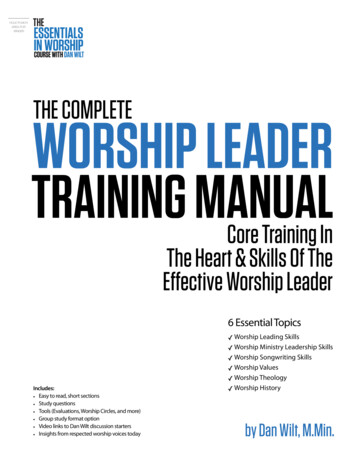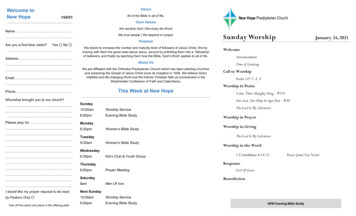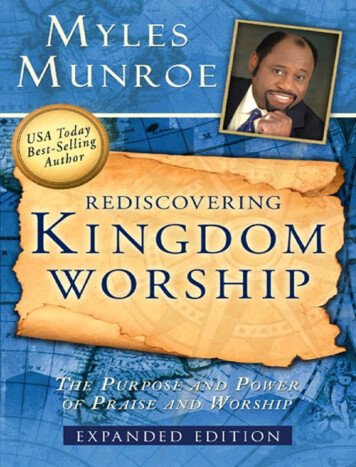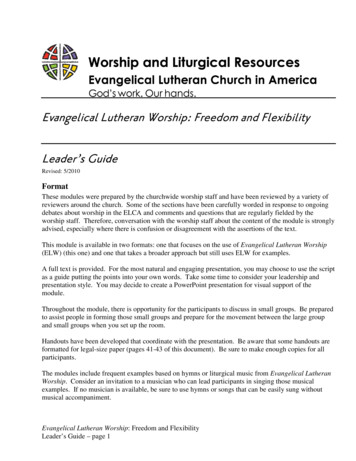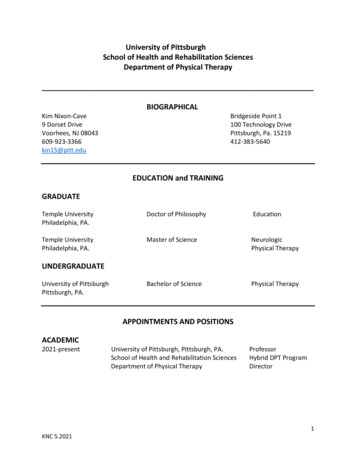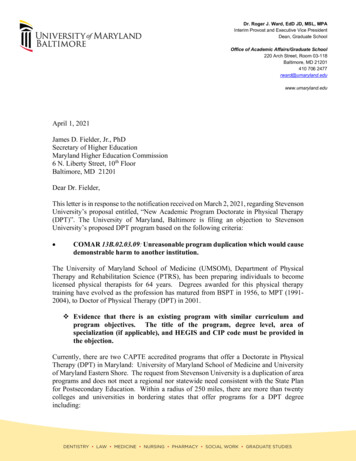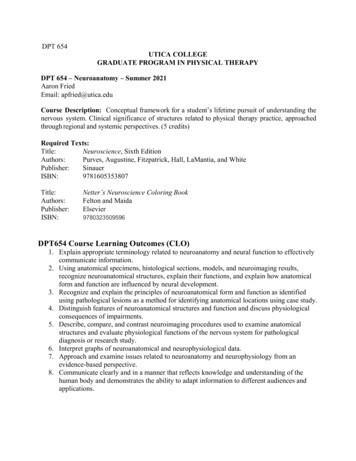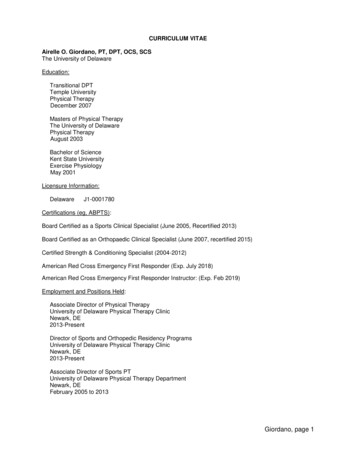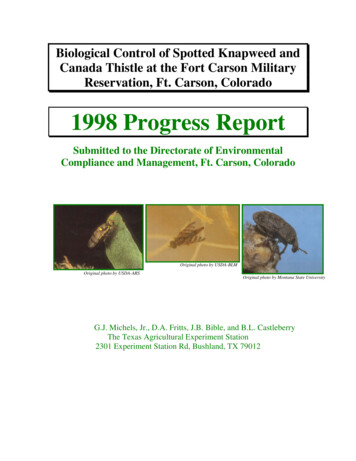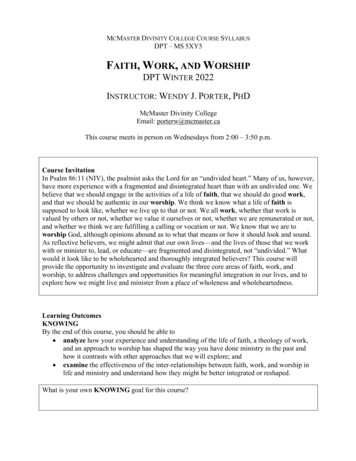
Transcription
MCMASTER DIVINITY COLLEGE COURSE SYLLABUSDPT – MS 5XY5FAITH, WORK, AND WORSHIPDPT WINTER 2022INSTRUCTOR: WENDY J. PORTER, PHDMcMaster Divinity CollegeEmail: porterw@mcmaster.caThis course meets in person on Wednesdays from 2:00 – 3:50 p.m.Course InvitationIn Psalm 86:11 (NIV), the psalmist asks the Lord for an “undivided heart.” Many of us, however,have more experience with a fragmented and disintegrated heart than with an undivided one. Webelieve that we should engage in the activities of a life of faith, that we should do good work,and that we should be authentic in our worship. We think we know what a life of faith issupposed to look like, whether we live up to that or not. We all work, whether that work isvalued by others or not, whether we value it ourselves or not, whether we are remunerated or not,and whether we think we are fulfilling a calling or vocation or not. We know that we are toworship God, although opinions abound as to what that means or how it should look and sound.As reflective believers, we might admit that our own lives—and the lives of those that we workwith or minister to, lead, or educate—are fragmented and disintegrated, not “undivided.” Whatwould it look like to be wholehearted and thoroughly integrated believers? This course willprovide the opportunity to investigate and evaluate the three core areas of faith, work, andworship, to address challenges and opportunities for meaningful integration in our lives, and toexplore how we might live and minister from a place of wholeness and wholeheartedness.Learning OutcomesKNOWINGBy the end of this course, you should be able to analyze how your experience and understanding of the life of faith, a theology of work,and an approach to worship has shaped the way you have done ministry in the past andhow it contrasts with other approaches that we will explore; and examine the effectiveness of the inter-relationships between faith, work, and worship inlife and ministry and understand how they might be better integrated or reshaped.What is your own KNOWING goal for this course?
PORTER – FAITH, WORK, AND WORSHIP DPT SYLLABUS – WINTER 2022DOINGBy the end of this course, you will be able to solve some problems of inconsistency and fragmentation/disintegration in your own lifeand ministry or for those within your circle of influence; design a more integrated approach to meaningful life and ministry that comprises thesethree areas; and implement an approach to faith, work, and worship that will increase your own wisdomand insight and will provide you with an effective model for others.What is your own DOING goal for this course?BEINGBy the end of this course, you will be able to reflect thoughtfully on how faith, work, and worship have shaped who you are; and risk having a more integrated engagement to faith, work, and worship and see itspotential to re-shape or revitalize who you are within the context of calling and ministry.What is your own BEING goal for this course?A Learning CommunityMy hope for this class is that we will be a mutual learning community, where each of us growsthrough encouragement, constructive input, and active engagement—with each other, withScripture, with intellectual ideas, and with practice-based insights. I encourage you to take risksin what you explore, share, and submit, and I will try to foster an environment where we cantrust each other with those outcomes. Each of us is in process, so come with an openness to bechallenged, reshaped, or re-formed, and to grow through our mutual learning experience. I willtry to empower each of you to develop as much as you are willing to, and to treat each of youwith respect and dignity. I ask for this in return. I am a fellow learner in this community. I willattempt to offer information, reflection, experience, and questions for each of us to processtogether, and to shape a welcoming environment for your contributions. I will try to givethoughtful evaluation and feedback to your thinking and to encourage your growth through ourcollaboration. As a responsible member of our learning community, I expect you to commityourself to the class throughout the semester that we are together. This means that you willendeavor to treat each person with respect and dignity, and that you will be prepared for andfully engaged in and with the class each week, both in person and through media. Your fullparticipation is required and critical for our learning community to function at an optimal level.I try to keep class correspondence to weekdays where possible, but I can be reached outsidethese times and certainly in a crisis. I welcome the opportunity to communicate with you.2
PORTER – FAITH, WORK, AND WORSHIP DPT SYLLABUS – WINTER 20223Required Textbooks (3)You may choose the optional book in each category if you have already read the first one, butcorrespond with the instructor about this first. You may also propose an alternative book, if youcan make a good case for it and have not previously read it.Faith:Hunter, James Davison. To Change the World: The Irony, Tragedy, and Possibility ofChristianity in the Late Modern World. New York, NY: Oxford University Press, 2010.Sociologist James Davison Hunter challenges the notions of what it means for Christiansto think that they can “change the world.” It should prompt thoughtful reflection. 345 pp.(optional) Taylor, Charles. A Secular Age. Cambridge, MA: Belknap Press of HarvardUniversity Press, 2007. Leading philosopher Charles Taylor will expose you to first-ratethinking about issues and challenges that influence the life of Christian faith. This book isnot for the faint of heart, but if you would like the challenge of engaging with Taylor’sinsights, it will be worth the effort. 850 pp.Work:Volf, Miroslav. Work in the Spirit: Toward a Theology of Work. New York: Oxford UniversityPress, 1991. This book by theologian and public intellectual, Miroslav Volf, compriseshis PhD research. It is a substantial and thoughtful approach to developing a theology ofwork. Let it challenge your ideas as you develop your own theology of work. 225 pp.(optional) Loftin, Keith R., and Trey Dimsdale, eds. Work: Theological Foundations andPractical Implications. London, UK: SCM, 2018. If you have previously read Volf’stheology of work, this book provides a range of contributors who discuss work fromperspectives of biblical theology, systematic theology, or practical theology. 255 pp.Worship:Wolterstorff, Nicholas. The God We Worship: An Exploration of Liturgical Theology. GrandRapids, MI: Eerdmans, 2015. Philosopher and liturgical theologian Nicholas Wolterstorffembarks on a new approach to liturgical theology in order to make “explicit theunderstanding of God implicit in Christian worship” (2). Regardless of your own worshippractices or traditions, you can apply his principles to investigate beliefs and perceptionsabout God that are inherent in your practices and statements. 170 pp.(optional) Wainwright, Geoffrey. Doxology: The Praise of God in Worship, Doctrine, and Life.London, UK: Epworth / New York, NY: Oxford University Press, 1980. If you havenever read a substantive theology of worship, this is an excellent place to begin. 585 pp.
PORTER – FAITH, WORK, AND WORSHIP DPT SYLLABUS – WINTER 20224Selected BibliographyDPT students should become familiar with about 4000 pages (approx. 20 books) for a DPTcourse. This means that you should have a grasp of the main content and significant contributionof these books to the field of study (not that you will have read every page). Find books from thesuggested list or elsewhere that resonate with or challenge you and that meet your goals for thiscourse, assignments, and your program. You will also find numerous academic articles that youcan include in your reading. Assemble your list and email it to the professor.All MDC students have access to many academic articles, chapters, and e-books throughMcMaster Library, as well as physical copies. See MDC’s l MDC students also now have access to the Digital Theological Library (DTL)https://libguides.thedtl.org/home, with many e-books, some free download of chapters or entirebooks, plus thousands of articles. Find your student code in information from the Registrar.FaithCapps, Donald. The Decades of Life: A Guide to Human Development. Louisville, KY:Westminster John Knox, 2008.Colorado, Carlos D., and Justin D. Klassen, eds. Aspiring to Fullness in a Secular Age: Essayson Religion and Theology in the Work of Charles Taylor. Notre Dame, IN: University ofNotre Dame, 2014.Davies, Oliver. Theology of Transformation: Faith, Freedom, and the Christian Act. New York:Oxford University Press, 2013.Edgar, William. Created & Creating: A Biblical Theology of Culture. Downers Grove, IL: IVPAcademic, 2017.Fowler, James W. Becoming Adult, Becoming Christian: Adult Development and ChristianFaith. San Francisco, CA: Jossey-Bass, 2000.Fowler, James W. Stages of Faith: The Psychology of Human Development and the Quest forMeaning. San Francisco, CA: Harper & Row, 1981.Moltmann, Jürgen. The Living God and the Fulness of Life. Trans. by Margaret Kohl. Louisville,KY: Westminster John Knox, 2015.Niebuhr, H. Richard. Christ and Culture. New York, NY: Harper & Row, 1951. 255 pp.Osmer, Richard R., and Friedrich L. Schweitzer, eds. Developing a Public Faith: New Directionsin Practical Theology. St. Louis, MO: Chalice, 2003.Sayers, Dorothy L. Christian Letters to a Post-Christian World: A Selection of Essays. GrandRapids, MI: Eerdmans, 1969. 230 pp. Later published as The Whimsical Christian: 18Essays. New York, NY: Collier, 1987.Tillich, Paul. Dynamics of Faith. New York, NY: Harper & Row, 1957. 135 pp.Volf, Miroslav, and Dorothy C. Bass, eds. Practicing Theology: Beliefs and Practices inChristian Life. Grand Rapids, MI: Eerdmans, 2002.Volf, Miroslav. A Public Faith: How Followers of Christ Should Serve the Common Good.Grand Rapids, MI: Brazos, 2011.
PORTER – FAITH, WORK, AND WORSHIP DPT SYLLABUS – WINTER 20225WorkAtkinson, Clarissa W. The Oldest Vocation: Christian Motherhood in the Middle Ages. Ithaca,NY: Cornell University Press, 1991.Bloch, Deborah P., and Lee J. Richmond, eds. Connections between Spirit and Work in CareerDevelopment: New Approaches and Practical Perspective. New York: Routledge, 2016.Cahalan, Kathleen A., and Bonnie J. Miller-McLemore, eds. Calling All Years Good: ChristianVocation throughout Life’s Seasons. Grand Rapids, MI: Eerdmans, 2017.Cosden, Darrell. A Theology of Work: Work and the New Creation. Paternoster TheologicalMonographs. Eugene, OR: Wipf & Stock, 2006.Cosden, Darrell. The Heavenly Good of Earthly Work. Grand Rapids, MI: Baker Academic,2006.Dale, Eric Steven. Bringing Heaven Down to Earth: A Practical Spirituality of Work. AmericanUniversity Studies Series VII: Theology and Religion 83. New York: P. Lang, 1991.Jamison, Christopher. The Disciples’ Call: Theologies of Vocation from Scripture to the PresentDay. New York: Bloomsbury T. & T. Clark, 2013.Jones, L. Gregory, and Stephanie Paulsell, eds. The Scope of Our Art: The Vocation of theTheological Teacher. Grand Rapids, MI: Eerdmans, 2002.Kidwell, Jeremy. The Theology of Craft and the Craft of Work: From Tabernacle to Eucharist.London: Routledge, 2016.Meilaender, Gilbert. The Freedom of a Christian: Grace, Vocation, and the Meaning of OurHumanity. Grand Rapids, MI: Brazos, 2006.Ostring, Elizabeth Ellen. Be a Blessing: The Theology of Work in the Narrative of Genesis.Eugene, OR: Wipf & Stock, 2016.Palmer, Parker J. Let Your Life Speak: Listening for the Voice of Vocation. San Francisco:Jossey-Bass, 2000.Placher, William C., ed. Callings: Twenty Centuries of Christian Wisdom on Vocation. GrandRapids, MI: Eerdmans, 2005.Reed, Esther D. Work, for God’s Sake: Christian Ethics in the Workplace. Sarum TheologicalLectures. London, UK: Darton, Longman and Todd, 2010.Smith, Gordon T. Courage and Calling: Embracing Your God-Given Potential. Downers Grove,IL: InterVarsity, 2011.Stevens, R. Paul. Aging Matters: Finding Your Calling for the Rest of Your Life. Grand Rapids,MI: Eerdmans, 2016.Stevens, R. Paul. Work Matters: Lessons from Scripture. Grand Rapids, MI: Eerdmans, 2012.
PORTER – FAITH, WORK, AND WORSHIP DPT SYLLABUS – WINTER 20226WorshipAlikin, Valery A. The Earliest History of the Christian Gathering: Origin, Development andContent of the Christian Gathering in the First to Third Centuries. Supplements toVigiliae Christianae 102. Leiden: Brill, 2010.Bechtel, Carol M., ed. Touching the Altar: The Old Testament for Christian Worship. CalvinInstitute of Christian Worship Liturgical Studies Series. Grand Rapids, MI: Eerdmans,2008.Best, Harold M. Unceasing Worship: Biblical Perspectives on Worship and the Arts. DownersGrove, IL: InterVarsity, 2003.Borchert, Gerald L. Worship in the New Testament: Divine Mystery and Human Response. St.Louis, MO: Chalice, 2008.Bradshaw, Paul F. Early Christian Worship: A Basic Introduction to Ideas and Practice. 2nd ed.Collegeville. MN: Liturgical, 2010.Bradshaw, Paul F. The Search for the Origins of Christian Worship: Sources and Methods forthe Study of Early Liturgy. New York, NY: Oxford University Press, 1992.Byars, Ronald P. What Language Shall I Borrow?: The Bible and Christian Worship. CalvinInstitute of Christian Worship Liturgical Studies Series. Grand Rapids, MI: Eerdmans,2008.Hoon, Paul Waitman. The Integrity of Worship: Ecumenical and Pastoral Studies in LiturgicalTheology. Nashville, TN: Abingdon, 1971.McGowan, Andrew B. Ancient Christian Worship: Early Church Practices in Social, Historical,and Theological Perspective. Alcuin Club Collections 91. Grand Rapids, MI: BakerAcademic, 2014.Moule, C. F. D. Worship in the New Testament. Ecumenical Studies in Worship 9. Richmond,VA: John Knox, 1961.Peterson, David. Engaging with God: A Biblical Theology of Worship. Grand Rapids, MI:Eerdmans, 1993.Porter, Wendy J., ed. Rediscovering Worship: Past, Present, and Future. McMaster NewTestament Studies. Eugene, OR: Pickwick, 2015.Saliers, Don E. Worship as Theology: Foretaste of Glory Divine. Nashville, TN: Abingdon,1994.Smith, James K. A. You Are What You Love: The Spiritual Power of Habit. Grand Rapids, MI:Brazos, 2016.Stringer, Martin D. A Sociological History of Christian Worship. Cambridge, UK: CambridgeUniversity Press, 2005.Wainwright, Geoffrey, and Karen B. Westerfield Tucker, eds. The Oxford History of ChristianWorship. New York, NY: Oxford University Press, 2006.White, James F. Introduction to Christian Worship. 3rd ed. Nashville, TN: Abingdon, 2000.Required books for this course are available from MDC’s book service, READ On Bookstore,located in the Hurlburt Family Bookstore at McMaster Divinity College. For advance andelectronic purchase, contact Bernice Quek, READ On Bookstore, 5 International Blvd,Etobicoke, Ontario M9W 6H3: phone 416.620.2934; fax 416.622.2308; email books@readon.ca.
PORTER – FAITH, WORK, AND WORSHIP DPT SYLLABUS – WINTER 2022Course Schedule (Wednesdays in-person from 2:00–3:50 p.m.)Week1DateJan 12DetailsWelcome and Introduction to the Course, Planning Assignments.Padlet Intro Video: Post a 1–2 min. intro of yourself.Module 1Week 2FAITHJan 19Week 3Jan 26Week 4Feb 23 weeks – Read Hunter or alternative book on Faith.Focus: Faith, part 1Post: Padlet Reflection 1 (200–250 words): Faith 1Read: Hunter, To Change the World, Essay I, pp. 1–96.DUE: Topic for Assignment 1. Consult with professor by email.Focus: Faith, part 2Post: Padlet Reflection 2: Faith 2Read: Hunter, To Change the World, Essay II, pp. 97–193.Focus: Faith, part 3Post: Padlet Reflection 3: Faith 3Read: Hunter, To Change the World, Essay III, pp. 195–286.Week 5Feb 9Module 2Week 6WORKFeb 16Week 7Feb 23BREAKWeek 8Mar 2Mar 9Module 3Week 9WORSHIPMar 16Week 10Mar 23Week 11Mar 30Week 12April 6DUE: Assignment #1 (Tues). DUE: Class presentations (Wed).3 weeks – Read Volf or alternative book on Work.Focus: Work, part 1Post: Padlet Reflection 4: Work 1Read: Volf, Work in the Spirit, Part I, pp. 1–65.Focus: Work, part 2Post: Padlet Reflection 5: Work 2Read: Volf, Work in the Spirit, Part II, pp. 67–156.DUE: Topic for Assignment 2. Consult with professor by email.NO CLASS during Hybrid Intensive Week at MDCFocus: Work, part 3Post: Padlet Reflection 6: Work 3Read: Volf, Work in the Spirit, Part II, pp. 157–201.3 Weeks – Read Wolterstorff or alternative book on Worship.Focus: Worship, part 1Post: Padlet Reflection 7: Worship 1Read: Wolterstorff, The God We Worship, chs. 1–4, pp. 1–70.Focus: Worship, part 2Post: Padlet Reflection 8: Worship 2Read: Wolterstorff, The God We Worship, chs. 5–7, pp. 71–125.DUE: Assignment #2 (Friday). A2L or email attachment.Focus: Worship, part 3Post: Padlet Reflection 9: Worship 3Read: Wolterstorff, The God We Worship, chs. 8–9, pp. 126–70.DUE: Class presentations.Course wrap-up and course evaluations.7
PORTER – FAITH, WORK, AND WORSHIP DPT SYLLABUS – WINTER 20228ASSIGNMENTS (3). You may choose one project instead of a paper.Note: Consider taking a thoughtful risk in one or more of your assignments. This does notguarantee a high mark, but almost always results in the most valuable learning experience.1. RESEARCH PAPER or PROJECT #1MARKS: 35%. Submitted Paper/Project: 30% In-Class Presentation: 5% 35%.Explore faith, work, or worship in a research paper or creative project. You must consult with theinstructor by Week 2 by email before finalizing your plans for either. At least one of your majorassignments should contribute to your focus in the DPT program.Research Paper: 4000–5000 words.Research one of our three themes that is significant to you. Your approach may be biblical,historical, theological, cultural, arts-based, practice of ministry, etc. Conform to MDC StyleGuide. Include substantive content and write at the level of a doctoral student. Interact with theauthors of at least 10–12 academic resources but show that you are doing your own thinking.Project. Thoughtfully design a project that explores significant issues or challenges orexpressions of one of our topics and merits 35%. Reflection. Include a short insightful reflection(1000 words) on your project, personal risks, and what you learned in the process.PAPER OR PROJECT DUE: Tuesday, February 8, midnight (30%). A2L or email.IN-CLASS PRESENTATION DUE: Wednesday, February 9, in class (5%).Summarize briefly for the class what you did for your assignment and something about yourpersonal learning in the process, including any risk. Presentations will be short and informal.2. RESEARCH PAPER or PROJECT #2MARKS: 40%. Submitted Paper/Project: 35% In-Class Presentation: 5% 40%.Explore faith, work, or worship in a research paper or creative project. You must consult with theinstructor by Week 7 by email before finalizing your plans for either. At least one of your majorassignments should contribute to your focus in the DPT program.Research Paper: 6000–7000 words.Dig deeply into one or two of our themes. Your approach may be biblical, historical, theological,cultural, arts-based, practice of ministry, etc. Use MDC Style. Include substantive content andwrite at the level of a doctoral student. Interact with the authors of at least 12–15 academicresources but show that you are doing your own thinking.Project. Thoughtfully design a project that explores significant issues or challenges orexpressions of one of our topics and merits 40%. Reflection. Include a short insightful reflection(1200 words) on your project, personal risks, and what you learned in the process.PAPER OR PROJECT DUE: Friday, March 25, by midnight (35%). A2L or email.IN-CLASS PRESENTATION DUE: Wednesday, April 6, in class (5%).Summarize briefly for the class what you did for your assignment and something about yourpersonal learning in the process, including any risk. Presentations will be short and informal.
PORTER – FAITH, WORK, AND WORSHIP DPT SYLLABUS – WINTER 202293. WEEKLY PADLET REFLECTIONMARKS: 25%.Post a weekly Padlet Reflection (200–250 words each). Respond graciously to at least two otherposts each week (50–75 words each). Thoughtfully interact with course material, readings, etc.Be as open as possible about your own questions and learning. This makes for a warm andsupportive learning community. Optional: You may include a relevant resource (e.g. art, music,poetry). There are 9 posts plus the intro video of yourself on the first week.Grading: Highest grades for this assignment are available to those who contribute each of theposts, who do so on time, whose posts are thoughtful and well-written, and who respond to atleast two other students’ posts. Late or missed posts cannot be made up later.DUE: Weekly Post by Tuesdays 5:00 p.m.DUE: Responses to at least two other posts by Thursdays 5:00 p.m.StyleAll stylistic considerations (including but not limited to questions of formatting, footnotes, andbibliographic references) must conform to the McMaster Divinity College Style Guidelines forEssays and Theses yle-guide/Failure to observe appropriate form will result in grade reductions.Academic HonestyAcademic dishonesty is a serious offence that may take any number of forms, includingplagiarism, the submission of work that is not one’s own or for which previous credit has beenobtained, and/or unauthorized collaboration with other students. Academic dishonesty can resultin severe consequences, e.g., failure of the assignment, failure of the course, a notation on one’sacademic transcript, and/or suspension or expulsion from the College. Students are responsiblefor understanding what constitutes academic dishonesty. Please refer to the Divinity CollegeStatement on Academic Honesty er Inclusive LanguageMcMaster Divinity College uses inclusive language for human beings in worship services,student written materials, and all its publications. It is expected that inclusive language will beused in chapel services and all MDC assignments. In reference to biblical texts, the integrity ofthe original expressions and the names of God should be respected, but you will need to usegender-inclusive language for humans, and you will need to quote from a gender-inclusiveversion such as the following: NRSV (1989), NCV (1991), TEV/GNB/GNT (1992), CEV(1995), NLT (1996), TNIV (2005), and the Common English Bible (CEB 2011).Deadlines and Late Submission PenaltyAssignments are due on the date and by the time indicated, after which they will be consideredlate. Late assignments may be docked incrementally up to 2% per calendar day. Assignments areto be submitted electronically to Avenue to Learn or directly by email to the professor.If there are any issues that could prevent your timely or successful completion of anassignment, please be in touch with the instructor immediately to discuss possiblealternatives. Be proactive—do not leave this to the last minute.DisclaimerThis syllabus is the property of the instructor and is prepared with currently availableinformation. The instructor reserves the right to make changes and revisions as necessary.
DPT - MS 5XY5 FAITH, WORK, AND WORSHIP DPT WINTER 2022 INSTRUCTOR: WENDY J. PORTER, PHD McMaster Divinity College Email: porterw@mcmaster.ca This course meets in person on Wednesdays from 2:00 - 3:50 p.m. Course Invitation In Psalm 86:11 (NIV), the psalmist asks the Lord for an "undivided heart." Many of us, however,
